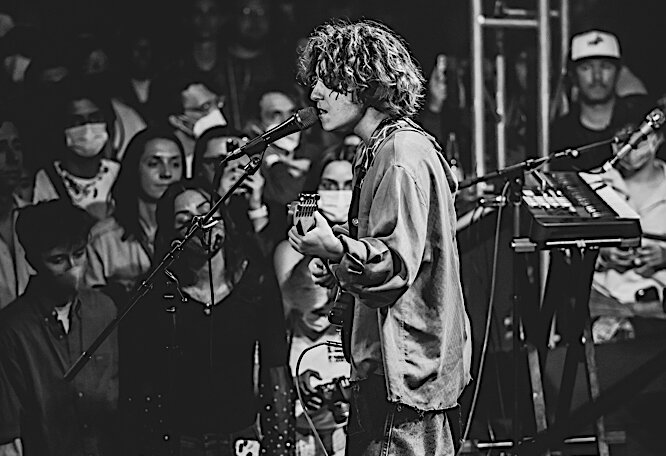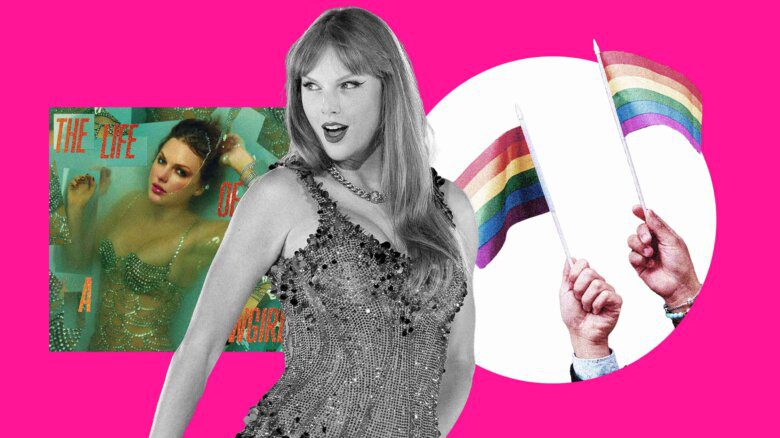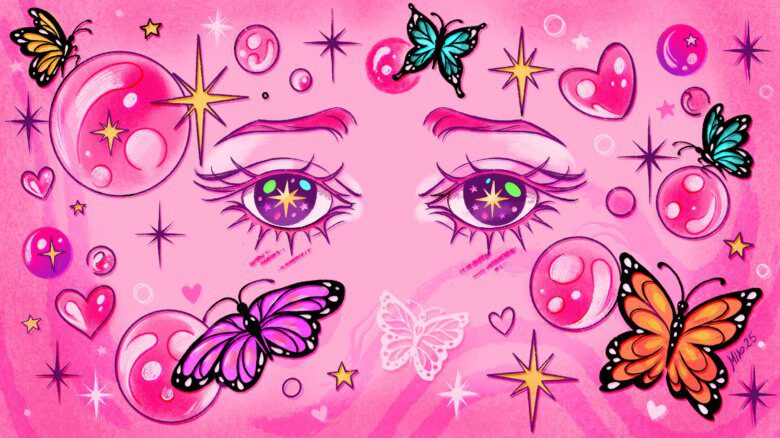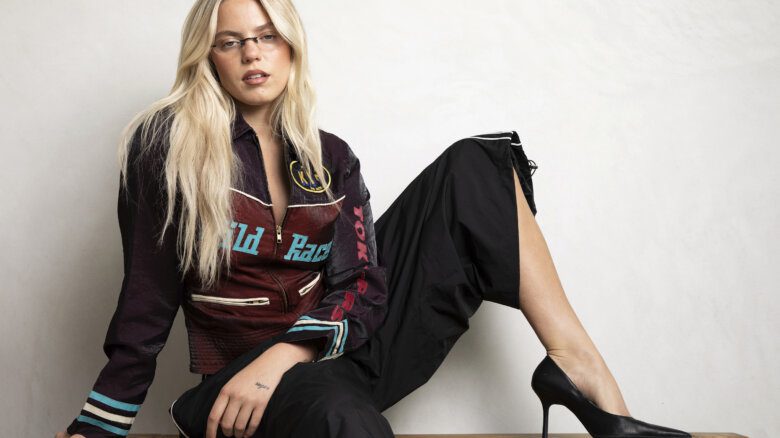It was at Outside Lands, a San Francisco music festival in late 2021, when I realized I was seeing something totally new happening live, onstage.
Singer-songwriter and producer Claud was playing one of their biggest shows yet, this time at a major festival. They’d opened for more established pop bands like Bleachers and The Neighbourhood before, but now they were headlining, and during the rocking, exhilarating set, I was struck by how fully-formed and confident their performance seemed.
Claud is 22 years old and officially five feet tall (though they jovially admit onstage to being 4 feet 11). During their festival set—especially during the performance of their track “That’s Mr. Bitch to You”—they seemed equally at ease emulating the antics of Bowie and Ronson, jamming and prostrating themselves in mock guitar god worship as they bopped around onstage with all the manic energy of the Peanuts gang dancing at the end of A Charlie Brown Christmas.
Claud is often categorized as bedroom pop, but their music blends and defies genres. They originally hail from the suburbs of Chicago, and are now on the road on their first-ever headlining tour. “It’s been really fun,” they say in a phone interview, with palpable disbelief. “I had no idea what to expect when I started, because I’ve never done a full headline tour before.” They love the sense of humour of their audiences—the “community,” they say—that has cropped up around their music, as well as the “baby queers” who attend the shows. “It’s been so fun! And really sweet.” (The North American leg of the tour continues until the end of March with dates in Philadelphia, Boston and Brooklyn. In May, the tour shifts to the U.K. and Europe.)
“I think a lot of my songs are things that I would never say out loud.”
Despite their commanding stage presence, most of Claud’s musical career has been defined by the internet—from their initial digital releases to online music videos (often poignant, with an understated sense of humour). Claud began releasing music in 2018, and their career quickly took off with the viral online hit “Wish You Were Gay” and an EP release; they’ve since maintained a prolific video and singles release schedule. In 2020, Claud was announced as the first artist signed to Saddest Factory (say it out loud), the new record label run by Phoebe Bridgers, the reigning queen of indie music.
“[Phoebe] just reached out to me because she heard my music and was a fan of it,” Claud says. “We had never met before or worked together before—she reached out because she liked my music and wanted to tell me that she was starting a label, and then that’s where our relationship began, our friendship and working together.”
Supermonster, Claud’s debut album, dropped the next year to critical acclaim. They are gifted at crafting melodies worthy of the pop charts, but excel at writing song lyrics with meticulously observed details that ring true to life. Claud’s singles reveal closely related thematic throughlines: the boundaries of gender expression, sexuality and bodily autonomy, often with an aching and haunting sense of yearning. “I think a lot of my songs are things that I would never say out loud,” they say, laughing, “or like, in real life to somebody.”
Claud is queer and, in a video blog, described their non-binary identity as “ mean[ing] that you don’t identify as a man or a woman, and I see gender as a really big spectrum—I think I fall somewhere in the middle of it.”
Yet Claud’s singles also map the growth in their understanding of queerness. “I don’t think [“Wish You Were Gay” is] something I would write today,” Claud says, breaking out into laughter. “I’m in a lot more queer communities and I don’t really meet a lot of people who, I guess, aren’t queer.” More laughter.
At the time they wrote the song, Claud says they were “still kind of young and new to my queerness.”
“I wrote the song probably like a year before I ever put it out or anything, or even showed it to anybody. So when I did put it out, we made the video in a way that captured my shyness around being queer, that I had for so long,” they say. “I think when it came out a lot of people who were in that place, or who had been there before, really resonated with it. So that was really special.”
Claud’s audience has responded to the artist’s own openness and vulnerability. Their fans’ comments online (to which Claud frequently replies) often respond to the emotional vulnerability in the music. “You’re my idol,” reads one, “as a non-binary teen and you’ve really helped me get through a really hard time in my life.”
Self-awareness is integral to Claud’s songwriting—and to their continued growth. “A big part of my writing process is reflection, and I think neglecting who you used to be is kind of hurting the process a little bit ’cause that informs so much of who you are now.”
Some of those same themes of exploring sexuality and gender expression are present in Claud’s most recent single release, “Tommy”—their most mature and heartbreaking song yet. “I wrote that song right after I had just gotten top surgery,” Claud says, “so I was feeling nervous, almost like I was reintroducing myself. Whether anybody else perceived it like that. I felt different from the day that I got [surgery], but most people wouldn’t notice it or understand or see. I was feeling really, really shy—more so than ever.” Despite the song’s name, “I don’t really know anybody named Tommy—it was sort of just a representation of how I was feeling—it was more symbolic than literal, more just about my insecurities.”
“There’s a joyousness and sense of abandon to the way Claud and their band blend musical styles.”
While they can come off as shy offstage, Claud evinces a fearlessness in their music and performance that comes from a sense of both vulnerability and an openness to exploration—a skill that took time to hone. “I used to play kind of timidly and would be afraid of how people were perceiving me,” they say. “But I sort of just got over that a little bit. Like, I’m here to have fun and so is everybody else, and there’s no reason to be shy about that, you know? There’s no reason to be afraid.”
On tour, Claud blends, mixes and crosses genre lines as easily as the themes of their music cross gender lines. Their single “If I Were You” (the recorded version of which is a mellow bedroom pop track) now features a tight reggae groove when performed live, while “Jordan,” an album cut originally featuring sweet electronic synths, now has the ragged edges of pop punk guitars. There’s a joyousness and sense of abandon to the way Claud and their band blend musical styles.
“You can add any element to any song at any time,” Claud says. “Trying out a new guitar part for a live version of a song is really important and is a good thing. So I kind of approach it similarly to the way I approach writing: What’s going to bring the most out of the song?”
When performing live, the band tends to launch boldly, confidently, from one song into the next. Claud performs with a sense of generosity, opening up space for both their bandmates and audience members to join in the fun. But during a show in San Francisco, around the midpoint of the tour, Claud paused. They wanted to take a moment to introduce their next track.
“This song,” Claud declared, “is about not being a woman!” before launching into a performance of “Mr. Bitch” destined to be a tour highlight.
The premise of the song is that an unnamed “straight man” calls the song’s narrator a “bitch,” to which Claud responds, “That’s Mister Bitch to you,” demanding due respect. The straight male antagonist of the song doesn’t get another word in; instead, Claud performs their own narrative onstage, rewriting an attempted insult into a jubilant performance of music and gender—their truth, which they replay night after night, with their audience joining in.
Claud makes this all seem effortless. But when they get to the bridge, the song takes on its sharpest edge. Addressing the male antagonist, Claud sings:
Bet your mama said you were the shit
You still go around believing it
But me, I’ve worked my ass off every day
Tried my best to get to where I am and where I’ll stay.
Despite how easy they make it all seem, you believe Claud when they say they’ve worked their ass off to get to where they are.
You also believe Claud has staying power. That’s because they’re a songwriter who doesn’t purport to have all the answers; they’re a performer who seems utterly at ease onstage even as they explore the most fraught aspects of identity.
Those seeming contradictions are what has allowed them to build community, first online and now onstage—hopefully for years to come.


 Why you can trust Xtra
Why you can trust Xtra


